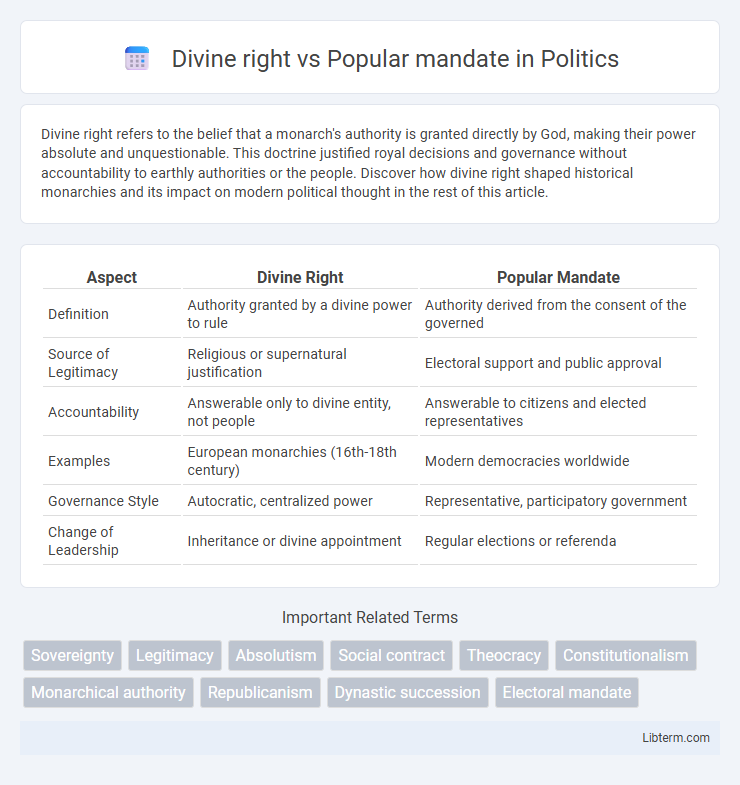Divine right refers to the belief that a monarch's authority is granted directly by God, making their power absolute and unquestionable. This doctrine justified royal decisions and governance without accountability to earthly authorities or the people. Discover how divine right shaped historical monarchies and its impact on modern political thought in the rest of this article.
Table of Comparison
| Aspect | Divine Right | Popular Mandate |
|---|---|---|
| Definition | Authority granted by a divine power to rule | Authority derived from the consent of the governed |
| Source of Legitimacy | Religious or supernatural justification | Electoral support and public approval |
| Accountability | Answerable only to divine entity, not people | Answerable to citizens and elected representatives |
| Examples | European monarchies (16th-18th century) | Modern democracies worldwide |
| Governance Style | Autocratic, centralized power | Representative, participatory government |
| Change of Leadership | Inheritance or divine appointment | Regular elections or referenda |
Understanding Divine Right: Origins and Principles
Divine right is a political and religious doctrine asserting that monarchs derive their authority directly from God, making their rule absolute and unquestionable. This principle originated in medieval Europe, particularly during the reign of James I of England, who emphasized that kings are accountable only to God. Understanding divine right highlights the historical context where the monarch's power was seen as sacred and legitimized by theological justification, contrasting sharply with modern democratic concepts like popular mandate based on electoral consent.
The Historical Legacy of Divine Rule
Divine right, rooted in the belief that monarchs derive authority directly from God, shaped political systems by legitimizing absolute power and suppressing dissent throughout medieval and early modern Europe. This doctrine justified the unchallengeable rule of kings, influencing state formation and governance models that prioritized loyalty to the sovereign as a sacred duty. In contrast, the historical legacy of divine rule often led to centralized autocracy, limited political participation, and resistance to emerging democratic ideals based on popular mandate.
Popular Mandate: Definition and Evolution
Popular mandate refers to the authority granted to a government or leader through the explicit consent of the people, typically expressed via democratic elections or referendums. This concept has evolved from ancient practices of communal decision-making to modern representative democracies, where legitimacy is derived from periodic voting and public approval. The popular mandate emphasizes accountability and responsiveness, contrasting the absolutism of divine right by rooting political power in the will of the electorate.
Key Differences Between Divine Right and Popular Mandate
Divine right asserts that monarchs derive authority directly from God, demanding unquestioned obedience as a sacred duty, while popular mandate bases political legitimacy on the consent and will of the governed, often expressed through elections or representative bodies. The key difference lies in the source of sovereignty: divine right centralizes power in an ordained ruler, whereas popular mandate disperses power through democratic participation. This distinction affects governance structures, accountability, and citizens' role in legitimizing political authority.
Case Studies: Monarchies vs Democracies
Monarchies like Louis XIV's France exemplify the divine right of kings, where authority was justified as divinely ordained, centralizing power without public consent. In contrast, democracies such as post-World War II Germany operate on popular mandate, deriving legitimacy from elected representatives reflecting citizens' will. Case studies highlight that monarchies often face legitimacy crises during social upheavals, while democracies rely on institutional frameworks to maintain authority through continuous public support.
The Role of Religion in Legitimizing Authority
Divine right theory asserts that monarchs derive authority directly from a deity, making their rule sacred and unchallengeable, often supported by religious institutions that legitimize this absolute power. In contrast, popular mandate relies on the consent of the governed, emphasizing secular justification for political authority through elections or representative institutions rather than religious sanction. Religious endorsement in divine right regimes intertwines spiritual and political domination, while popular mandate separates church and state, promoting legitimacy based on collective human agreement.
Public Consent: Foundation of Modern Governance
Public consent serves as the cornerstone of modern governance, contrasting sharply with the divine right theory where authority is inherited and unquestionable. Unlike divine right, which claims power granted by a higher power, popular mandate derives legitimacy directly from the people's will through electoral processes. This shift emphasizes accountability, transparency, and responsiveness, reinforcing democratic principles that empower citizens to shape government policies and leadership.
Challenges and Critiques of Divine Right Theory
The Divine Right Theory faces challenges due to its lack of accountability, as rulers claiming authority from a higher power often ignore the will of the people, leading to potential despotism and tyranny. Critics argue that this theory undermines democratic principles by rejecting popular consent and justifying absolute power, which can result in social unrest and resistance. Historical instances, such as the English Civil War, highlight how divine right monarchies faced significant opposition when their legitimacy was questioned by emerging demands for popular sovereignty.
Popular Mandate in Contemporary Politics
Popular mandate in contemporary politics represents the authority granted to leaders or governments through democratic elections, reflecting the will of the electorate. This concept ensures accountability as leaders derive legitimacy from the consent of the governed rather than hereditary or divine rights. The popular mandate strengthens democratic institutions by emphasizing participation, transparency, and responsiveness to public needs.
Future Trajectories: Shifting Concepts of Legitimacy
Future trajectories in political legitimacy reveal a marked shift from divine right toward popular mandate, emphasizing citizen participation and consent as foundational principles. Emerging democracies increasingly replace hereditary or divine claims with electoral legitimacy, reflecting global trends toward inclusive governance and accountability. Technological advancements and social media further amplify public engagement, accelerating the decline of absolutist legitimacy in favor of dynamic, participatory models.
Divine right Infographic

 libterm.com
libterm.com